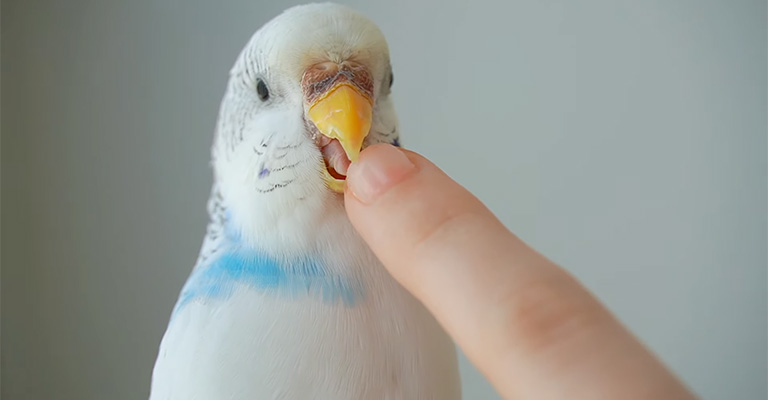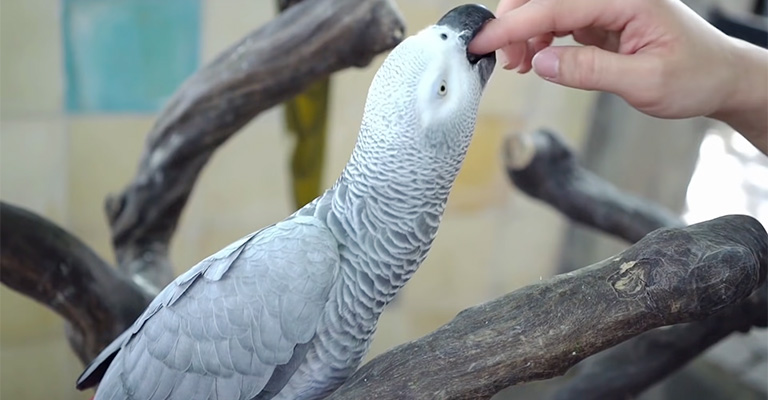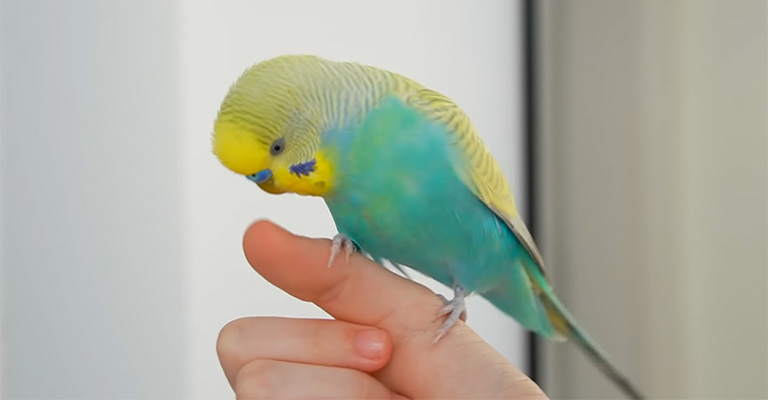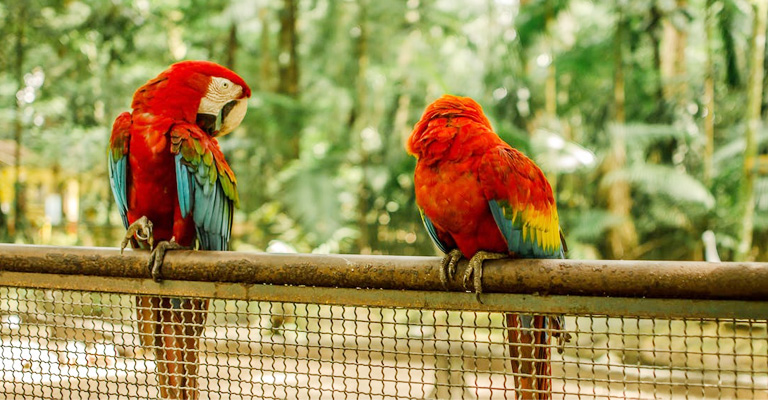My parrot bit me and drew blood. I was shocked and scared because it had never happened before. I searched the internet for answers and found lots of information about what causes your bird to bite you, but not much on how to stop them from doing it again.
The good news is that most cases of parrot biting can be solved with time and patience! The bad news is that some types of parrot biting are more serious than others – such as when they bite their owners or other people in their household. But let’s get started on the basics first.

Reasons Why A Parrot Can Start Biting All Of A Sudden
Here are the most significant reasons of a Parrot can start biting all of a sudden.
1. Fear

Parrots are intelligent animals, and they can sense your emotions. If you are nervous or scared, your parrot may also become afraid. Your parrot may also be afraid of the cage he/she is in or another person or animal in the room.
If there is too much noise going on around your bird, this could also make him/her anxious and cause him/her to bite you out of fear.
If your parrot has been confined for some time without being able to fly around freely (such as when he/she is kept inside during winter), then it might get frustrated with being caged up all day long and lash out at whoever comes near them.
2. Aggression
Aggression is a natural bird behavior, but many factors can exacerbate it. These include:
- Hormonal imbalance – Aggression may be the result of an estrogen or testosterone imbalance, which is often caused by the bird’s diet or lack of sleep.
- Poor diet – A poor-quality diet can lead to a hormonal imbalance that causes aggression in birds. This can happen because some foods contain hormones that are metabolized into estrogen or testosterone in your pet’s body as they digest them, leading to an imbalance if these products are consumed regularly over time (or even once). For example, soybeans have been shown to have a high level of phytoestrogen activity–meaning they contain compounds called phytoestrogens which mimic human estrogens (elevated levels of which increase the risk for breast cancer).
3. Bite for Attention

If your parrot bites for attention, it’s probably because he doesn’t know how else to get your attention. Your parrot might be trying to tell you something or get your help with something.
If this is the case, it’s important that you learn what your bird’s body language means so that you can recognize when he needs something from you and then give him what he wants without having to resort to biting or other aggressive behavior.
4. Out of Frustration
Parrots are very intelligent animals, and they can be easily bored. If you have a parrot that bites, it may be because he is frustrated or bored. Your parrot needs more attention and stimulation than you can give him right now.
This could mean adding more toys, interacting with the bird more often, giving him more freedom (by letting him fly around the house), and ensuring he gets enough sleep at night to refresh him for playing during the day!
5. Hungry or Thirsty
When your parrot is hungry or thirsty, it will try to get at its food and water bowls. Your bird’s cage should be placed in a place where the parrot can easily reach its food and water bowls. If you have a large parrot, you may need to move the cage so that it’s just a short distance from where the bird eats.
6. New Environment Or Unfamiliar People

It is normal for your bird to be scared and anxious when you bring them home, especially if they have never been in a new environment before. The same goes for any other unfamiliar person who enters your home.
The first few days after bringing home a new pet will be stressful for you and your pet, so prepare yourself by setting up an area where you can bond without interruption from others around the house (or even outside).
How to Stop It?
How to stop when your bird bites you and drew blood. Here are some tips-
1. Don’t Use The Cage As Punishment
The first thing you need to do is stop using the cage as a punishment. The bird will associate this with something negative and will feel afraid of it in the future, which can lead to accidents like biting.
The second thing you should avoid doing is putting your bird in its cage when angry or sad. This may seem obvious, but some people don’t realize how much their emotions affect their pets!
2. Territorial Behavior

Parrots are very territorial and will defend their territory to the death if necessary. This means you should keep your bird away from other pets in the house or any humans who visit you often. If another animal comes into their space, your parrot may attack them because it feels like they’re invading its territory and trying to take over its home.
If you want to make sure that your bird doesn’t hurt anyone else (or itself), it’s best not to let them out of their cage at all times. Even if there aren’t any other animals around for them to see.
You also shouldn’t allow anyone else near or inside of their cage unless they have experience with birds; otherwise, there’s a chance that someone could get bitten while trying something new with your parrot’s toys or food bowl.”
3. Establishing Trust And Bond
You have to establish a bond with your parrot. You need to be consistent in how you deal with them, as well as patient, calm, confident, and assertive.
This will help create trust between you both so that they know what is expected of them when interacting with people who are not their owners or carers.
4. Building Confidence And Reducing Fear
You’ll need consistency and patience to build Confidence and reduce fear. You can’t just expect your parrot to trust you overnight. It takes time for them to learn that they can rely on you as a source of comfort and safety.
If your bird has been bitten by someone before, it may take longer than usual for them to warm up to new people in the house (especially if those people are children).
If this is the case with your bird, try spending more time alone together so they get used to spending time with just one person at a time before introducing other family members.
5. Avoiding Sudden Movements Or Aggressive Behavior
- Keep a safe distance from the bird.
- Refrain from making sudden movements, especially if you are near its nest or the bird is protecting it.
- Please don’t stare at the bird for too long, as this can be interpreted as aggression by some species and may cause them to attack you in defense of their young.
- If a pet bird has bitten you, do not scream or yell at them, as this could frighten them into biting again the next time they see you near its cage/pen, etc…
FAQ
There can be several reasons why a bird may bite and draw blood. It could be due to fear, stress, territoriality, pain, or discomfort. Birds may also bite if they feel threatened or if they are protecting their nest or eggs. Understanding the specific triggers and circumstances surrounding the biting incident is essential to addressing the behavior.
Preventing bird bites involves a combination of patience, training, and creating a safe and comfortable environment for your bird. Spend time bonding with your bird, gradually introducing positive interactions and rewards. Avoid sudden movements, loud noises, or anything that may startle or agitate your bird. Provide plenty of mental and physical stimulation through toys, proper diet, and regular exercise to minimize stress or frustration.
If your bird bites and draws blood, it’s important to remain calm. Wash the wound with mild soap and warm water to prevent infection, and apply an antiseptic or antibiotic ointment. If the bite is severe or if it shows signs of infection, consult a medical professional. Additionally, take the opportunity to reflect on the circumstances that led to the bite and address any underlying issues with your bird’s behavior.
Consistent training and positive reinforcement are key to discouraging biting behavior in birds. Use reward-based training methods to teach your bird appropriate behaviors, such as stepping up on command or interacting gently. Identify and avoid situations that trigger your bird’s aggression, and redirect its focus to more desirable activities or toys. Seek advice from avian behaviorists or experienced bird trainers for specific techniques tailored to your bird’s needs.
Yes, certain medical conditions can contribute to a bird’s aggressive behavior, leading to biting. Pain, hormonal imbalances, infections, or underlying health issues can affect a bird’s mood and temperament. If you notice a sudden change in your bird’s behavior or if biting becomes persistent and uncharacteristic, it’s important to consult an avian veterinarian. They can evaluate your bird’s health and provide appropriate treatment or recommendations.
Conclusion
Prevention and understanding are the keys to harmony when it comes to birds biting and drawing blood. By delving into the causes behind this behavior, we can address the underlying issues and establish a safe and respectful relationship with our feathered friends.
Birds have reasons for biting, Whether fear, territoriality, or discomfort. Patience, proper handling techniques, and creating a positive environment can go a long way in curbing this behavior. Remember, education and empathy are vital in deciphering the needs of our avian companions.
So, if your bird has left a mark, don’t despair. With a gentle touch, knowledge, and a commitment to nurturing their well-being, you can foster a bond built on trust and mutual respect, ensuring that the only thing that fills the air is the joyous melody of your feathered friend.